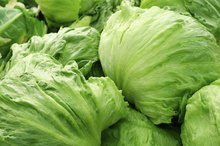What does fact checked mean?
At Healthfully, we strive to deliver objective content that is accurate and up-to-date. Our team periodically reviews articles in order to ensure content quality. The sources cited below consist of evidence from peer-reviewed journals, prominent medical organizations, academic associations, and government data.
The information contained on this site is for informational purposes only, and should not be used as a substitute for the advice of a professional health care provider. Please check with the appropriate physician regarding health questions and concerns. Although we strive to deliver accurate and up-to-date information, no guarantee to that effect is made.
What Vitamins & Minerals Do Olives Have?
Olives are fruits of the olive tree and are known as “Olea europaea” or “oil of Europe.” Though small in size, olives are packed with a variety of beneficial vitamins and minerals 6. Both the green and black olives contain these invaluable nutrients, only differing in degree of ripening -- black olives are simply green olives that are left on the tree for a longer period of time before harvesting 6.
Vitamin E
Olives contain vitamin E, which acts as a potent lipid-soluble antioxidant to protect the cell membranes and other tissues from harmful free radicals 6. It also plays a role in red blood cell formation, helps the body use vitamin K and keeps the blood vessels from getting too constricted. One tbsp. of olives provides 0.14 mg of vitamin E, also known as alpha-tocopherol. The Institute of Medicine recommends 15 mg per day 3.
Vitamin A
Vitamins in Iceberg Lettuce
Learn More
Olives also provide vitamin A, a vital nutrient that helps form and maintain healthy teeth, bones and skin 26. It serves as an antioxidant to protect cells against the effects of free radicals. One tbsp. of canned olives offer 34 IU of vitamin A 6. The recommended daily amount of vitamin A for adult males and females is 900 and 700 IU, respectively.
Lutein and Zeaxanthin
Olives also contain small amounts of lutein and zeaxanthin, antioxidant compounds that are closely related to vitamin A and that filter harmful rays in the eye, according to the American Optometric Association 46. One tbsp. of olives contains 43 ug of the carotenoids. While the USDA does not have a recommended daily intake for lutein and zeaxanthin, recent studies have shown a health benefit with lutein and zeaxanthin supplementation at 10 mg and 2 mg per day, respectively.
- Olives also contain small amounts of lutein and zeaxanthin, antioxidant compounds that are closely related to vitamin A and that filter harmful rays in the eye, according to the American Optometric Association 4.
Calcium
Are Canned Sardines Healthy?
Learn More
Relative to their size, olives contain a significant amount of calcium -- 7 mg per tablespoon. Calcium is vital for bone structure, blood clotting, nerve impulse transmission, muscle contraction and secretion of hormones. It also activates and stabilizes proteins and enzymes, optimizing their activities. The daily recommended amount is 1,000 to 1,200 mg per day of calcium, depending on the period in the life cycle.
- Relative to their size, olives contain a significant amount of calcium -- 7 mg per tablespoon.
- The daily recommended amount is 1,000 to 1,200 mg per day of calcium, depending on the period in the life cycle.
Iron and Zinc
Olives are a good source of iron and zinc 6. They provide 3.3 mg of iron, or about 25 percent of the daily value, and 0.22 mg of zinc, or 17 percent of the daily value, in 1 cup of olives 6. Iron is essential for the hemoglobin in red blood cells. Zinc is required for DNA and protein synthesis, immune support, and wound healing.
Other Vitamins and Minerals
Olives also contain magnesium, potassium, phosphorus, copper and selenium in very small quantities, in addition to vitamins B-1 to B-6 and vitamin K. Vitamin K is essential for blood clotting, while the B vitamins have a variety of important physiological functions 6. Polyphenols and flavonoids, beneficial compounds that appear to have significant anti-inflammatory properties, are also present in olives 6.
Related Articles
References
- Medline Plus: Vitamins
- USDA Nutrient Database: Olives
- American Optometric Association: Lutein and Zeaxanthin
- Linus Pauling Institute: Calcium
- Olives 101: Olives and Vitamins
- Olives, green. FoodData Central. U.S. Department of Agriculture. Published April 1, 2020.
- Olives, black. FoodData Central. U.S. Department of Agriculture. Published April 1, 2020.
- Omar SH. Oleuropein in olive and its pharmacological effects. Sci Pharm. 2010;78(2):133-54. doi:10.3797/scipharm.0912-18
- Schwingshackl L, Hoffmann G. Monounsaturated fatty acids, olive oil and health status: a systematic review and meta-analysis of cohort studies. Lipids Health Dis. 2014;13:154. doi:10.1186/1476-511x-13-154
- Montoro BP, Benomar N, Lavilla Lerma L, Castillo Gutiérrez S, Gálvez A, Abriouel H. Fermented Aloreña table olives as a source of potential probiotic strains. Front Microbiol. 2016;7:1583. doi:10.3389/fmicb.2016.01583
- La Fata G, Weber P, Mohajeri MH. Effects of vitamin E on cognitive performance during ageing and in Alzheimer's disease. Nutrients. 2014;6(12):5453-5472. Published 2014 Nov 28. doi:10.3390/nu6125453
- Omar SH. Mediterranean and MIND diets containing olive biophenols reduces the prevalence of Alzheimer's disease. Int J Mol Sci. 2019;20(11). doi:10.3390/ijms20112797
- McMacken M, Shah S. A plant-based diet for the prevention and treatment of type 2 diabetes. J Geriatr Cardiol. 2017;14(5):342-354. doi:10.11909/j.issn.1671-5411.2017.05.009
- Esteve C, Montealegre C, Marina ML, García MC. Analysis of olive allergens. Talanta. 2012;92:1-14. doi:https://doi.org/10.1016/j.talanta.2012.01.016
- Tang S, Avena-Bustillos RJ, Lear M, et al. Evaluation of thermal processing variables for reducing acrylamide in canned black ripe olives. J Food Engineer. 2016;191:142-130. doi:10.1016/j.jfoodeng.2016.07.011
Writer Bio
Danna Biala began writing professionally in 2010. She is completing her master’s degree in applied physiology and nutrition from Columbia University and is currently interning to become a registered dietitian. Biala holds a Bachelor of Science in biochemistry from Brandeis University.









